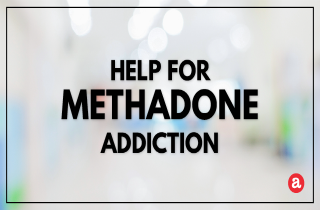Methadone addiction help
Methadone is frequently prescribed to treat substance addiction; most commonly for treating opiate withdrawal symptoms. But what do you do if you think you’re addicted to this narcotic painkiller? Are there signs of opiate addiction even in the medications that are used to treat it?
First off, you are not alone. It is possible to get addicted to methadone. And treating methadone addiction is similar to other types of opiate addictions. Here, we look at treatment modalities and useful resources for methadone addicts, friends and family. Then, we invite your questions about methadone at the end.
How to help methadone addiction
The irony of methadone addiction is that methadone is commonly used for the treatment of hard opiate drug addiction. So while treating drug dependencies to morphine or heroin, you can become addicted to your own medicine in a sense. Though methadone use may be considered a lesser evil than cocaine or heroin addiction, it can still have serious consequences such as dangerous changes in heartbeat, liver toxicity, behavioral changes, changes in sleep patterns and sex drive, depression and even death.
So how can you help treat methadone addiction? There are three main ways to help methadone addiction.
1. Taper off methadone use – The first step in addressing methadone addition is to try and taper off the use of the drug with the help of other drugs, counseling and other interventions. The person being treated is advised about the dangerous (and in cases fatal) possible consequences of overdose of methadone and is also told about the importance of using it only as prescribed and is also given information about possible drug interactions. Ask your prescribing doctor for a tapering calendar.
2. Control withdrawal symptoms (short and longer term) – This phase of treatment is oriented towards easing the withdrawal symptoms experienced when a user goes off the drug. Physical stabilization promotes your rehabilitation as a productive and functional member of the community. The aim is to achieve physical and mental stability with the help of a doctor as well as a counselor or psychiatrist who will uncover and treat underlying psychological and emotional issues that may be fueling addiction.
3. Psychological treatment – Further treatment may involve developing coping mechanisms to prevent a relapse into addictive behaviors, healthy responses to stress and the tools to deal with everyday problems without resorting to drugs and medications. Specifically, cognitive behavioral therapy is seen to be effective in overcoming a range of drug dependencies including methadone. Psychotherapy helps offer insight into the behavior of an addict and also helps create effective measures to prevent relapses.
Getting help for methadone addiction
Overcoming methadone addiction is not going to be easy, but acknowledging the fact that a problem exists and that help is needed, is a huge and very significant first step. And help is at hand within the family, the larger community and from experts who have the knowledge and experience to offer the most effective kind of help. Where can you get help for methadone addiction?
Addiction specialist / Methadone addiction treatment center – Enrolling with an inpatient addiction treatment center is one option. Getting into an outpatient program with an addiction specialist is another. Consider what is best given the circumstances and logistics. Other programs such as 12 set groups, self-help programs, individual counseling, family therapy and group therapy can be a part of treatment.
Friends and family – Friends and family can get involved to help an addict avoid triggers and create safer environments within the home and community – at the workplace, in school or college. Loved one can get involved to help in the recovery process by recognizing enabling behaviors in individuals and helping the addict avoid these. Additionally, a trusted religious or community leader can also help provide wise counsel and spiritual guidance.
Psychiatrist, Psychologist or Social worker – Taking that all important first step towards defeating a methadone addiction means reaching out. A medical processional trained in psychology, a social worker or even a family physician can offer you the guidance you need. These medical and social professionas have wide experience and their medicaltraining could be invaluable to you.
How to help a methadone addict
An intervention by family or friends could be an important first step towards recovery, particularly if the addict is in denial and is evasive about their situation. Some specific ways that you can help a methadone addict are to:
- Consider family therapy
- Fix an appointment
- Get information about addiction resources and get in touch with addiction experts and facilities
- Help lower stress and triggers within the home or work environments
- Identify and stop enabling behavior
- Involve other close family members and friends
Methadone addiction help and help lines
Help for methadone addiction can be just a phone call away. Helpful resources, treatment facilities, contact numbers and are available. Questions and identities can be kept confidential so an addict or anyone close to them can call without hesitation. 24/7 Treatment Referral Line for substance abuse from Substance Abuse and Mental Health Services Administration (SAMHSA) – 1-800-622-HELP – more information at SAMHSA treatment website and the find treatment locator page
Help with methadone addiction questions
Things may seem hopeless and overwhelming right now, but help is close at hand. Please share any questions or comments you have on the topic of methadone addiction at the bottom of the page. We will get back to you as soon as possible.









Related Posts